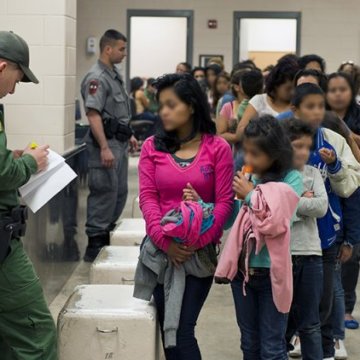- About
- Topics
- Picks
- Audio
- Story
- In-Depth
- Opinion
- News
- Donate
- Signup for our newsletterOur Editors' Best Picks.Send
Read, Debate: Engage.
| topic: | Refugees and Asylum |
|---|---|
| located: | USA, Guatemala, El Salvador |
| editor: | Yair Oded |
As part of an agreement signed by the American and Guatemalan governments last year, close to 1,000 asylum seekers from El Salvador and Honduras were deported to Guatemala upon arrival to the United States between November 2019 and March 2020. The agreement, signed in July of last year, designated Guatemala as a safe third country that could accept Central American migrants fleeing violence – despite the fact that Guatemala is far from meeting the standards stipulated by U.S. law for what constitutes a safe country and has no functioning asylum mechanism.
A recent report compiled by Refugees International and Human Rights Watch reveals that migrants sent to Guatemala under the agreement were abused by U.S. border officers and misled about the details of the agreement and their ability to lodge asylum requests in the U.S. The migrants interviewed by the report's authors stated that they now face similar dangers in Guatemala to those in their countries of origin.
The Asylum Cooperative Agreement (ACA) with Guatemala stipulates that migrants from El Salvador and Honduras must apply for asylum in Guatemala and be rejected before they can file asylum requests in the U.S. Back in November 2019, the U.S. government began deporting hundreds of migrants to Guatemala as part of ACA despite the visceral objection of numerous American and Guatemalan lawmakers and media outlets.
Guatemala has been ranked by the U.S. government itself as “one of the most dangerous countries in the world,” in a 2019 report by the State Department. Guatemala suffers from exceedingly high rates of murder and pervasive gang and gender-based violence (often with impunity for perpetrators). Guatemala also produces the highest number of Central American migrants fleeing for their lives and has a highly dysfunctional asylum mechanism crippled by bureaucratic hurdles and paltry legislation.
Migrants interviewed by Refugees International and Human Rights Watch stated that upon arrival in the U.S. they were held in inhumane conditions at detention facilities; some claimed they were verbally abused by Customs and Border Protection (CBP) officials. Many of them also stated that they were not given an opportunity to have their asylum claims heard. Some claimed that all the information they were handed regarding the program was in English and that they did not understand they were being sent to Guatemala or that they would have to apply for asylum there.
The report further details the situation faced by the deported migrants once they reached Guatemala, and indicates that many of them felt they were in as much danger in Guatemala as they were in their home countries. “Indeed, many transferees noted that in their home countries they at least understood the context and had social networks that they could rely on. Few found remaining in Guatemala to be a feasible option because it is a dangerous and poor country where they lack familial or social ties,“ the report states.
According to data by the Guatemalan government, only 20 out of the 939 migrants sent to the country as part of ACA applied for asylum.
The advent of COVID-19, combined with a lack of support for the programme by the UN Refugee Agency (UNHCR) and Guatemala’s inability to handle the flow of migrants funnelled from the U.S., had led to a halt of the programme for the foreseeable future.
The pandemic has also, however, served as an excuse for the Trump administration to ramp up immediate deportations of people crossing the border from Mexico and block new asylum requests – The Intercept reports. The White House is also reportedly advancing deals similar to ACA with the government of El Salvador.
Back in Guatemala, the damage inflicted by ACA continues to impact migrants. Psychologist Sucely Donis, who works at Guatemala City’s only shelter for asylum seekers, told the authors of the report that, “the ACA creates a seemingly never-ending ‘circle of violence’ in which asylum seekers are in a constant state of mental stress and never have the opportunity to pause and decompress in a safe environment.”
She went on to describe how “those who arrive under the ACA are often suffering from post-traumatic stress disorder and chronic stress, as well as physical illnesses – respiratory infections, headaches, palpitations.”
Highlighting the fact that many of these migrants are young adults or children, Donis concluded that, “We are destroying a generation.”

